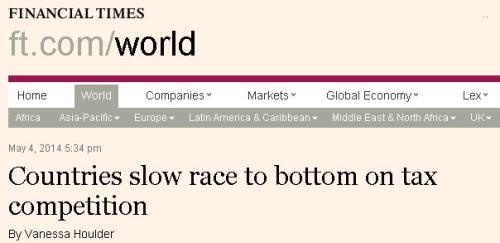Perhaps there is an occasional exception, but when someone in a public policy debate mentions a “race to the bottom,” they always seem to favor bigger government and punitive taxation.
Here are a few examples:
The Organization for Economic Cooperation and Development, a bureaucracy based in Paris, wants to rewrite international tax norms for business income because “failure to collaborate … could be damaging in terms of … a race to the bottom with respect to corporate income taxes.”
The International Monetary Fund also prefers cartels over competition. As the UK-based Guardian reported, “Instead of a race to the bottom where countries compete with each other to offer the lowest rate of corporate tax, it urges co-operation.”
Whether the issue is welfare reform of Medicaid block grants, opponents of federalism complain about decentralization “creating a ‘race to the bottom’ as states slashed funding on services for the poor.”
One of the cranks from the Occupy movement was given a platform by the OECD to complain that, “Tax havens and secrecy jurisdictions bring governments into a harmful race to the bottom.”
And Jeffrey Sachs, writing for the Financial Times, hyperventilated about “a runaway social crisis in many high-income countries. …governments are now in a race to the bottom with regard to corporate taxation”
As you can see, “race to the bottom” is a term that statists use when advocating policies to increase the size, scope, and power of government.
They certainly have the right choose their rhetoric, even though I wish (in the case of the OECD and IMF) that they weren’t being subsidized with my money to push their destructive agenda.
And it makes sense for statists to use this strategy. After all, a “race to the bottom” sounds like a bad thing.
So you can understand that I get irked when the establishment press, which is supposed to be neutral, adopts the left’s rhetoric. Consider this headline from areport in the Financial Times.
 ‘
‘
The article itself is not nearly as bad as the headline, so this may be the bias of an editor rather than the bias of a reporter.
Regardless, it sets the tone and obviously would lead an unwitting reader to think it is a good thing that nations aren’t lowering tax rates as much as they did in previous years.
My main point of today’s column is to complain about media bias, but since our example is about the supposed “race to the bottom,” this is also an opportunity to cite the work of the great Nobel Prize-winning economist, Gary Becker, who just passed away.
…competition among nations tends to produce a race to the top rather than to the bottom by limiting the ability of powerful and voracious groups and politicians in each nation to impose their will at the expense of the interests of the vast majority of their populations.
Amen. Tax competition encourages better policy by reducing the power of government.
With regards to bad policy, I want a race to the bottom. That’s what creates a race to the top for prosperity.
P.S. Since we’re on the topic of tax and whether people should pay more or pay less, remember the “Buffett Rule” from the 2012 campaign?
President Obama said every rich person should cough up at least 30 percent of their income to the IRS.
And Warren Buffett volunteered to be Obama’s prop, even distorting his own tax data to facilitate the President’s class-warfare agenda.
Well, it seems that Mr. Buffett is a bit of a hypocrite. Read some of what the Wall Street Journal opined this morning.
…the Berkshire Hathaway CEO seems to have adapted his famous Buffett Rule of taxation when it applies to his own company. …it was fascinating to hear Mr. Buffett explain that his real tax rule is to pay as little as possible, both personally and at the corporate level. “I will not pay a dime more of individual taxes than I owe, and I won’t pay a dime more of corporate taxes than we owe. And that’s very simple,” Mr. Buffett told Fortune magazine in an interview last week. …The billionaire was even more explicit about his goal of reducing his company’s tax payments. “I will do anything that is basically covered by the law to reduce Berkshire’s tax rate,” he said. …Too bad Mr. Buffett didn’t share this rule with voters in 2012.
Tax minimization is both the legal right and the moral responsibility of every citizen.
Unless, of course, you think – ignoring both theory and evidence – that the crowd in Washington spends money more wisely than the private sector.
P.S. Mr. Buffett should be happy he’s an American rather than a Brit. If he lived in London, the supposedly conservative-led government would probably condemn him for legally keeping his taxes as low as possible.
